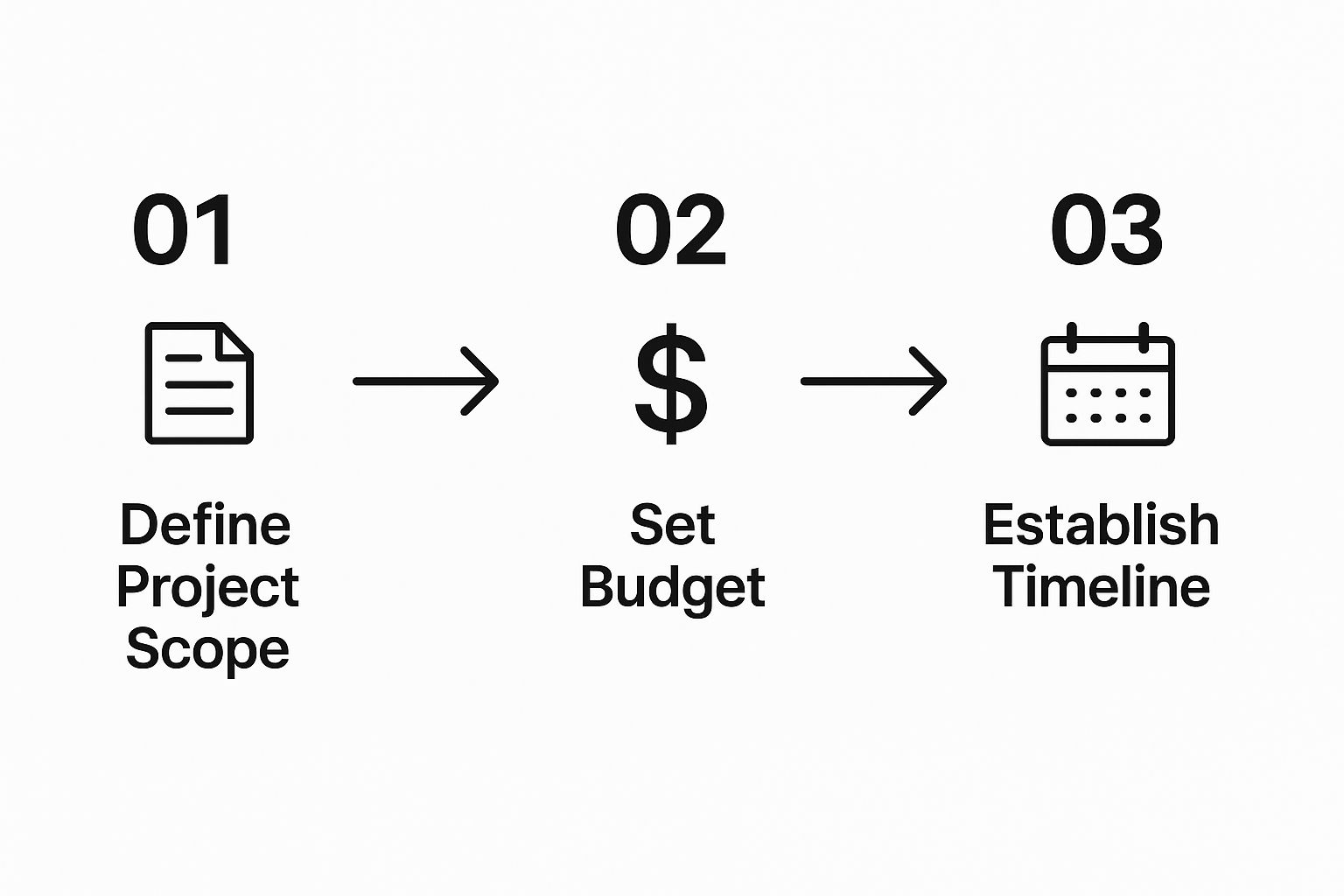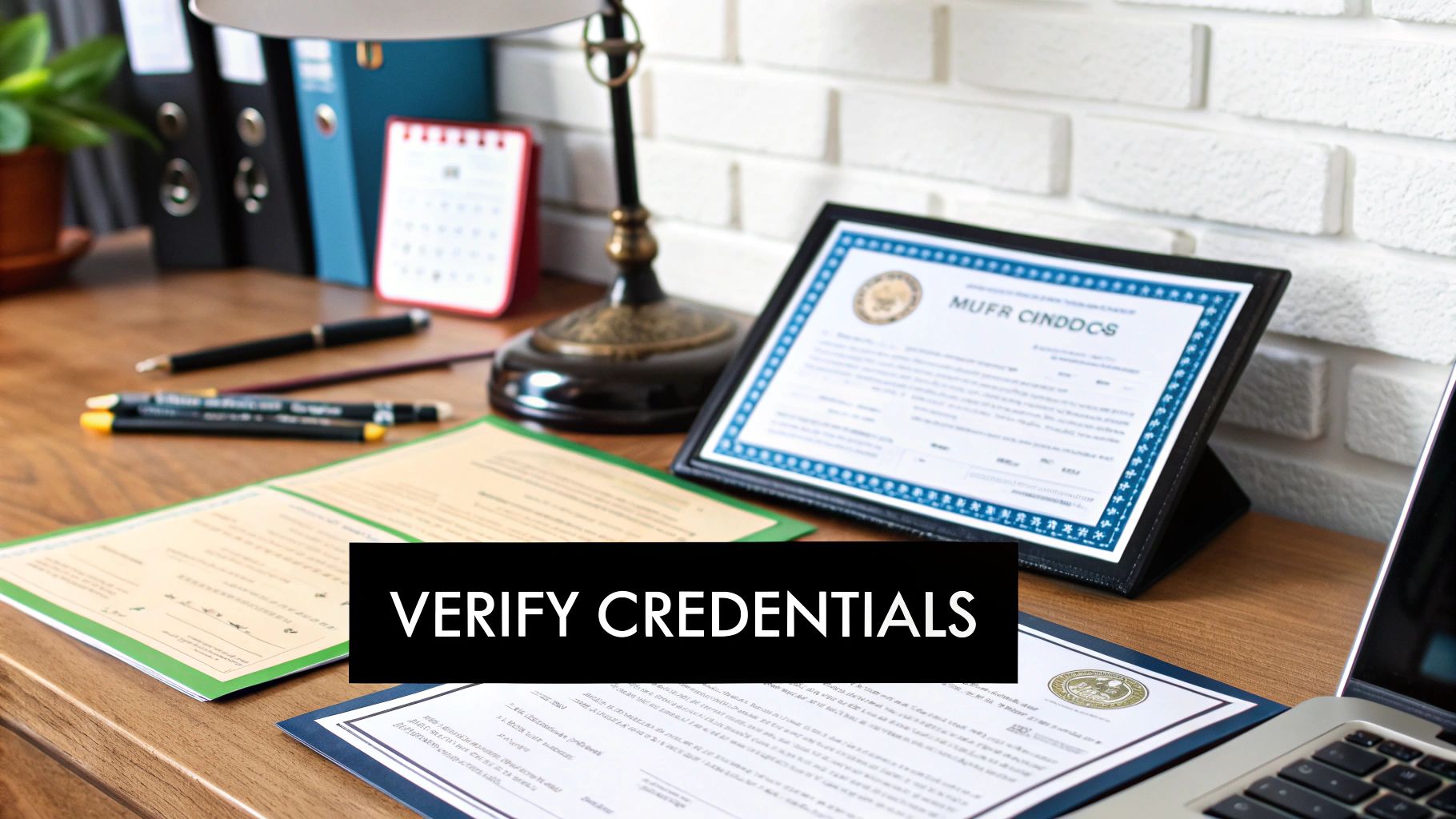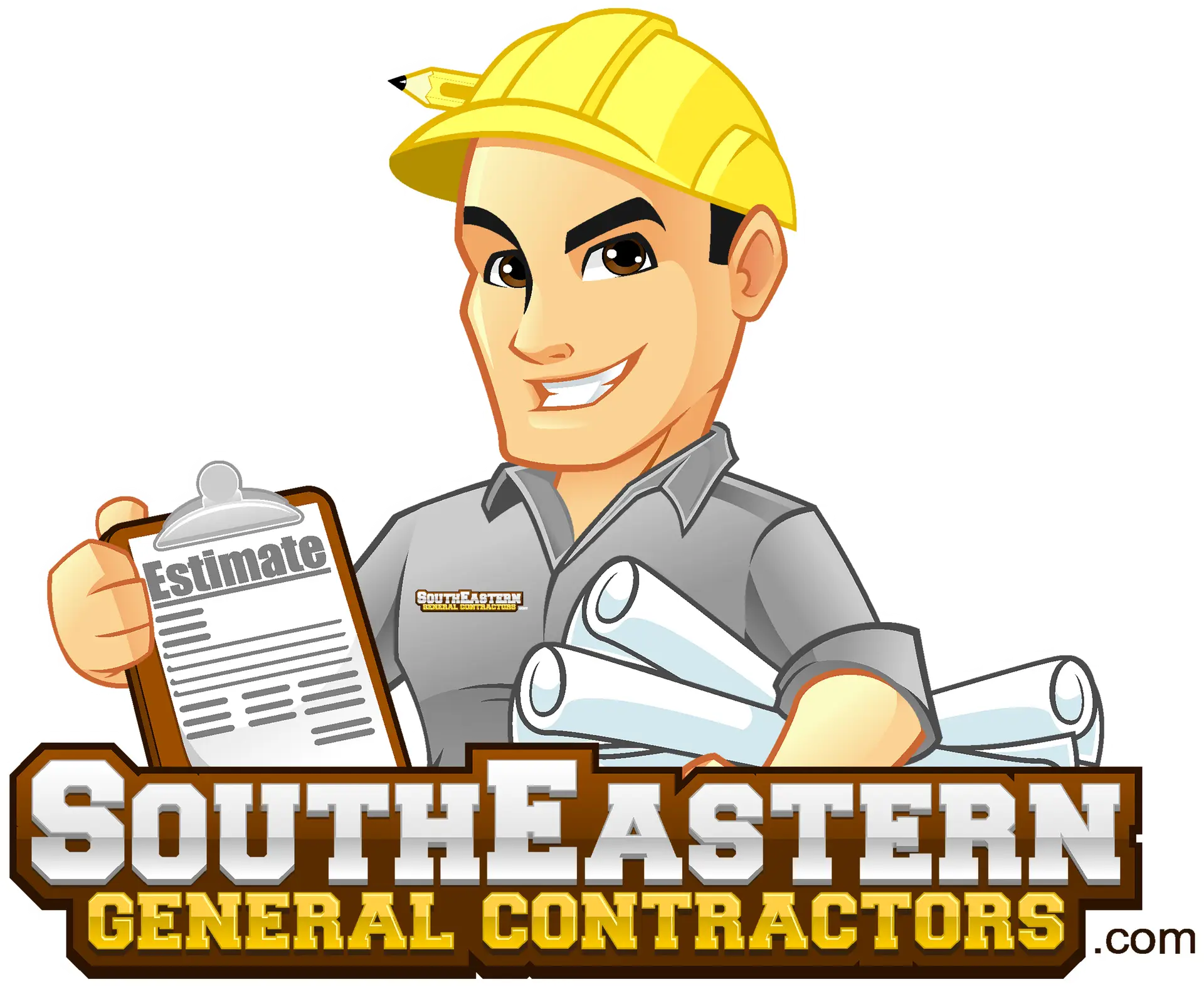
How to Find a Good Contractor Your Neighbors Trust
Before you even start looking for a contractor, the most important work begins. It’s all about becoming an expert on your own project first. That means creating a detailed blueprint that clearly defines your scope, budget, and timeline. Nail this down, and you’ll be able to communicate your vision so clearly that any professional can give you a truly accurate bid right from the start.
Laying the Groundwork: Your Project Blueprint
I've seen it time and time again: homeowners who rush into calling contractors without a solid plan. This is hands-down the biggest reason projects go over budget, miss deadlines, and end in frustration. A well-thought-out, documented plan isn't just a nice-to-have; it's your single best defense against the chaos that can derail a renovation.
This isn't about jotting down a simple wish list. We're talking about creating a comprehensive scope of work. Think of it as a detailed recipe for your project. Don't just write "new kitchen floor." Actionable Insight: Instead, specify "Install 12×24 inch porcelain tile in a herringbone pattern in the kitchen (approx. 200 sq. ft.). Scope includes removal and disposal of existing vinyl flooring, and installation of new quarter-round trim painted to match existing baseboards." The more detail you provide, the better the bids you'll receive.
Define Your Project Vision and Scope
The first real step is to get your vision out of your head and onto paper. This is where you translate abstract ideas into the concrete specifics a contractor can actually price out and build. From my own experience, putting together a "project folder"—either a physical binder or a digital one on your computer—is an incredibly powerful tool.
Actionable Insight: Create a dedicated project folder (physical or digital) that becomes the single source of truth for your project. It must contain:
- Inspiration Photos: Pull images from magazines or sites like Pinterest that capture the exact style, colors, and finishes you're after. Add notes to each photo specifying what you like about it.
- Material Selections: Get specific. List out your choices for flooring, countertops, fixtures, and even paint colors (include the brand and color code). If you can, get physical samples.
- A "Must-Have" vs. "Nice-to-Have" List: This is your secret weapon for making smart decisions if the budget needs a little tweaking later on. For example, "Must-have: quartz countertops. Nice-to-have: under-cabinet lighting."
Taking the time to build this detailed plan is a critical step in avoiding some of the most common mistakes people make when building, ensuring everyone is on the same page from day one.
Set a Realistic Budget and Timeline
Once you have a clear scope, you can confidently tackle the budget. Actionable Insight: Use online cost estimators for your zip code as a starting point, then get quotes for your big-ticket materials. Add a contingency fund of 15-20% on top of your estimate. This isn't just "extra" money; it's a non-negotiable buffer for the unexpected surprises that always come up during a renovation.
A project without a contingency fund is a project destined for stress. Treat this buffer as a non-negotiable part of your total budget to handle surprises without derailing your finances.
Your timeline needs to be just as grounded in reality. Actionable Insight: Work backward from your ideal completion date. List out each phase (planning, demolition, framing, plumbing/electrical, drywall, finishing) and assign a generous time estimate to each, then add two buffer weeks for potential delays.
This whole process—from scope to budget to timeline—is fundamental to a successful outcome.

Visualizing these three interconnected elements makes it clear: a successful project always starts with a well-defined scope, which in turn allows for a realistic budget and a practical timeline.
Remember, the contractors you're about to hire are operating in a massive economic environment. The U.S. construction market is valued at around $2 trillion, making it a complex beast subject to supply chain snags and material shortages. The very best contractors are the ones who use data and modern tools to manage these risks, which is how they deliver on time and on budget. Their ability to navigate this landscape is a true sign of their professionalism.
Vetting Contractors Like a Seasoned Pro

Alright, you’ve got your shortlist of contractors. Now, the real work begins. This is where you put on your detective hat and dig deeper than a few online reviews. You’re looking for evidence of true professionalism and reliability, not just a slick sales pitch. This is your best defense against hiring someone who talks a great game but can’t deliver.
The first move is to independently verify everything the contractor has told you. A true professional will expect this—in fact, they'll respect you for it. Anyone who gets defensive when you ask for their license number or proof of insurance is a walking red flag.
Your Vetting Checklist: The Non-Negotiables
Don't just take their word for it. Here's how you can confirm their qualifications on your own.
- License Check: Every state has a licensing board for contractors, and you need to become familiar with yours. Actionable Insight: Google "[Your State] contractor license board" to find the official website, then use their search tool to look up your contractor's name or license number. Confirm their license is active and check for any public complaints or disciplinary actions.
- Insurance Verification: Ask them for a certificate of insurance showing both general liability and workers' compensation. Actionable Insight: Don't just look at the paper. Call the insurance agency listed on the certificate and ask to confirm that the policy is currently active and paid up. This simple call protects you from financial liability if an accident occurs on your property.
- Complaint History: The Better Business Bureau (BBB) is still a valuable resource. A quick search can tell you if any formal complaints have been lodged against the company. A clean record is a very good sign.
This initial due diligence is your foundation. It confirms you're dealing with a legitimate business that operates by the rules. Once you've covered these basics, it's time to dig into the quality of their work.
Digging Into Their Past Work and Reputation
A contractor’s portfolio is their professional resume. Don't be fooled by the one perfect, sun-drenched photo on their homepage. Ask to see a full gallery for a few recent projects similar to yours. You’re looking for consistency, not just a couple of cherry-picked glamour shots.
Actionable Insight: When you call references, don't just ask, "Were you happy with the work?" Ask specific, open-ended questions like: "How did the contractor handle unexpected problems?", "Was the crew respectful of your home and did they clean up daily?", and "Did the final bill match the quote, or were there surprises?". The answers will reveal far more about their character and process.
A contractor's financial health is another critical, yet often overlooked, detail. It speaks volumes about their ability to finish your project without a hitch. The global general contracting market is enormous, projected to hit $1.415 trillion by 2033. In such a competitive field, only the financially stable companies survive and thrive. A solid contractor can handle supply chain hiccups or market shifts without your project grinding to a halt. You can learn more about these market forces in this general contracting market report.
By taking these methodical steps, you're not just hiring help; you're building a complete picture of each candidate. This process gives you the confidence to know you're handing your investment and your trust over to a true professional.
Conducting Interviews That Reveal True Character

Okay, you've done the research and narrowed down your list. Now it's time for the interview, which is where you really get to see who you’re dealing with. Think of this less as a formal Q&A and more as a conversation to gauge their personality, communication style, and overall professionalism. This is your gut-check moment.
Forget the canned questions they’ve heard a hundred times. You need to dig deeper to understand how they actually operate when things get complicated—because on any project, they will. A great contractor is a project manager, a problem-solver, and a communicator rolled into one. Your questions need to pull back the curtain on these skills.
Questions That Uncover Their Process
Anyone can say they’re a great communicator. You want them to prove it. The key is to ask situational questions that require them to share real-world stories and demonstrate their thought process.
Actionable Insight: Here are specific questions to ask every potential contractor:
- "Walk me through a time a project went completely off the rails. What was the unexpected issue, how did you communicate it to the homeowner, and what did you do to fix it?" This question tells you everything about their honesty and problem-solving abilities.
- "How will I receive updates on project progress? Will it be a daily text, a weekly email summary, or do you use a specific project management app?" This isn't just about preference; it sets a clear expectation for communication from day one.
- "How do you ensure your subcontractors adhere to the project timeline and quality standards? What's your process if one of them underperforms?" A good general contractor takes full responsibility for their crew, no excuses.
- "Let's talk about change orders. What's your exact process when I want to add something or if we discover something that needs to be removed from the original plan?" A pro will have a clear, fair, and documented system for this.
Pay close attention to how they answer. Are they giving you specific, confident examples? Or are the answers vague and evasive? A contractor who knows their stuff will have no problem recalling details from past jobs.
Expert Tip: The best sign of a great contractor is that they interview you as much as you interview them. They'll ask sharp questions about your vision, your budget, and how you make decisions. They’re also vetting you to make sure the partnership will be a good one.
Gauging Professionalism and Personality Fit
Beyond what they say, watch what they do. Are they actively listening, making eye contact, and maybe even taking notes? Or do they seem distracted, waiting for their turn to talk? Someone who is genuinely interested in your project will be engaged and ask thoughtful questions.
Actionable Insight: After the interview, ask yourself: "Do I feel comfortable calling this person with bad news or a difficult question?" If the answer is no, they aren't the right fit, no matter how good their work looks. This person and their team will be in your home for weeks or months, and that personal chemistry is essential.
If a contractor is respectful, professional, and easy to talk to during this meeting, it’s a strong signal they’ll maintain that attitude throughout the entire project. This is a critical step in how to find a good contractor who will feel more like a partner than just a hired hand.
Decoding Bids to Find the Best Value
https://www.youtube.com/embed/cOzada8k6l8
Getting a few bids back is an exciting moment. Finally, your project feels real! But this is also where many homeowners make their first big mistake—they jump straight to the bottom line and pick the lowest price.
Let me be clear: the cheapest bid is rarely the best value. More often than not, it’s a sign of trouble ahead. Real value isn’t just about the final number; it's found in the thoroughness, transparency, and professionalism of the proposal itself. Learning to read between the lines is one of the most important skills you can develop in this process.
When you spread several bids out on your kitchen table, the differences in quality and clarity will jump out at you. A professional's bid is a comprehensive roadmap for your project. A vague, one-page quote is a giant red flag.
The Anatomy of a High-Quality Bid
A bid from a trustworthy contractor should make you feel informed and confident, not confused. It’s their plan for a successful project, and it should be completely transparent.
Actionable Insight: When you get a bid, use this as a checklist. A professional proposal must include:
- Itemized Material & Labor Costs: The proposal must break out what you’re paying for materials versus what you’re paying for labor. It shouldn't just say "new flooring." It should specify something like, "7-inch wide engineered white oak flooring, Brand XYZ, Model #123."
- A Detailed Scope of Work: This section is critical. It should read like a detailed checklist of every single task, from the first day of demolition to the final coat of paint and cleanup.
- Subcontractor Fees: If your remodel involves specialized trades like electricians or plumbers, their costs should be listed clearly. No surprises.
- A Milestone-Based Payment Schedule: Never agree to a payment plan based on arbitrary dates. A professional schedule ties payments to tangible progress—for example, "Payment 2 (25%) due upon completion and inspection of drywall installation." To get a better sense of what's normal, you can look into the different pricing structures contractors use.
Spotting Red Flags in a Contractor's Bid
The proposal itself is a window into a contractor's work ethic and business practices. A price that’s dramatically lower than the others often means they’re planning to use cheap materials or an inexperienced crew. An overly simple bid usually means the contractor is leaving wiggle room to hit you with "unforeseen" costs later on.
A bid that seems too good to be true almost always is. It’s often a sign that a contractor has missed something in the scope, is using subpar materials, or, in a worst-case scenario, is planning to cut corners.
This is also where a contractor’s financial health comes into play. The construction industry has its ups and downs. For example, Statista reports that the top 250 international contractors saw their revenues drop from $544 billion in 2013 to $398 billion by 2021. A financially stable contractor is better prepared to weather these storms without it affecting your project. A detailed, realistic bid is a good indicator that a contractor has a firm grip on their own finances.
Don't Sign Anything Until You Read This: Finalizing the Contract

You’ve done the hard work of vetting, interviewing, and finally picking your contractor. It’s a huge relief, but don't pop the champagne just yet. This next step—the contract—is arguably the most critical part of the entire process.
A casual handshake or a verbal "we're good to go" is a recipe for disaster in this industry. A detailed, legally sound contract is the only thing that truly protects your investment, your home, and your sanity.
This formal agreement isn't about being difficult or showing a lack of trust. It's about getting on the same page. A well-written contract forces both you and the contractor to agree on every single detail upfront. It becomes your project's constitution, preventing misunderstandings and giving you a clear path to follow if things go sideways.
The Must-Have Clauses for Any Project Contract
Think of your contract as the project's official rulebook. It needs to be incredibly specific, leaving absolutely no room for interpretation. Skimming this document is a massive mistake; you need to go through it with a fine-tooth comb.
Actionable Insight: Before you sign, physically take a highlighter to the contract and mark these essential elements to ensure they are present and clear:
- A Complete Scope of Work: This shouldn't just be "remodel kitchen." It needs to be an exhaustive list of every single task, from demolition and framing to specific installation methods, finishing touches, and final cleanup. It must reference brand names, model numbers, and material choices.
- A Milestone-Based Payment Schedule: Never agree to pay based on dates. Payments should be tied directly to tangible progress—things you can see and touch. For example, a payment is due after the foundation is poured, or when framing passes inspection. Avoid paying more than 10-30% upfront.
- Firm Start and Completion Dates: Yes, weather and supply chain issues happen. But the contract still needs a clear starting date and a projected completion date. This creates accountability and a target for everyone to work toward.
This level of detail is the standard for the kind of professional construction and renovation work you can see in our services portfolio.
A contract's main job is to kill assumptions. If you talked about a specific Pella window or that Italian porcelain tile you love, its exact name and product number better be in writing. If it's not in the contract, it doesn't legally exist.
Provisions That Shield You From Risk
Beyond the basics of what, when, and how much, a solid contract anticipates problems. It builds in legal guardrails to protect your project from the common pitfalls that can derail a renovation or new build.
Actionable Insight: Insist on these critical protections and do not sign a contract without them:
- A Clear Change Order Process: Your project will change. It's almost guaranteed. A good contract defines exactly how those changes are handled: how they are proposed, priced out, approved in writing by you, and officially added to the project's scope and schedule.
- Proof of Insurance: The contract should list the contractor’s general liability and workers' compensation policy numbers. Even better, it should have a copy of their certificate of insurance attached.
- Lien Waivers: This is a non-negotiable. A lien waiver is a signed document from your contractor (and any subcontractors they use) stating they've been paid for their work and waive any right to put a mechanic's lien on your property. You should get these signed waivers with every payment you make.
- Dispute Resolution Clause: This section outlines the specific steps you and the contractor will take to solve a conflict if one arises, like mediation or arbitration, before anyone has to call a lawyer.
Making sure these points are covered is the final, crucial step. It ensures your project starts on a secure foundation, setting the stage for a smooth and successful build from beginning to end.
Answering Your Final Questions About Hiring a Contractor
Even when you've done all your homework, a few last-minute questions always seem to pop up right before you sign on the dotted line. It's completely normal. Let’s walk through some of the most common "what-ifs" that homeowners grapple with during this final stage. Getting these sorted out is the last step to feeling truly confident in your choice.
The journey to find a great contractor is packed with details, so it's smart to address any lingering concerns. Here's some practical advice for the questions I hear most often.
How Many Bids Should I Actually Get?
For any project of significant size, you should always aim for at least three solid, detailed bids. This is the magic number. It gives you enough information to get a real sense of the market rate and see different potential solutions without drowning you in paperwork.
If you only get one or two, you're flying blind. You have no real reference point to know if a price is fair, too high, or suspiciously low. On the flip side, chasing down five or six bids often leads to "analysis paralysis," making the decision feel impossible. Three gives you the clarity you need.
Actionable Insight: For this comparison to mean anything, every contractor needs to be bidding on the exact same project. Give each of the three contractors the exact same detailed scope of work document you created. If one quotes for basic laminate countertops and another for high-end quartz, you’re not comparing apples to apples—you're just comparing random numbers.
Is a Big Down Payment a Red Flag?
Absolutely. Be very wary of any contractor who asks for a large sum of money upfront. A reasonable, industry-standard down payment is usually between 10% and 30% of the total project cost. This initial payment is there to cover the first wave of material purchases and officially book your project on their calendar.
Actionable Insight: If a contractor asks for 50% or more upfront, you should walk away. It's a massive red flag that could signal they have serious cash flow issues (meaning they're using your money to finish someone else's job) or, in a worst-case scenario, they're planning to take the money and run. Payments should always be tied to progress, not just dropped in their lap before work begins.
What's the Real Difference Between an "Estimate" and a "Bid"?
This is a critical distinction that can save you a lot of headaches and money. People often use these terms as if they're the same, but in the construction world, they mean very different things.
- An Estimate: Think of this as a ballpark figure. It’s a rough, non-binding guess at the cost, usually given early on before all the details are nailed down. It's a starting point for a conversation, nothing more.
- A Bid: This is a formal, detailed, and specific price to complete the work described in your scope. Often called a "quote" or "proposal," it should break down the costs for labor, materials, and everything in between. This is the number you can take to the bank.
Actionable Insight: When a contractor gives you a document, ask them directly: "Is this a non-binding estimate, or is this a firm bid that I can sign off on?" Always push to move past the casual estimate and get a comprehensive written bid. This detailed document is what gets written into your final contract, turning a guess into a firm commitment.
Navigating the complexities of construction is what we do every day. At South Eastern General Contractors, we're committed to building lasting relationships based on clear communication and exceptional quality. We want every client to feel confident and cared for, from our first conversation to the final walkthrough. If you're ready to start your project with a team you can trust, learn more about our approach at South Eastern General Contractors.
Article created using Outrank



